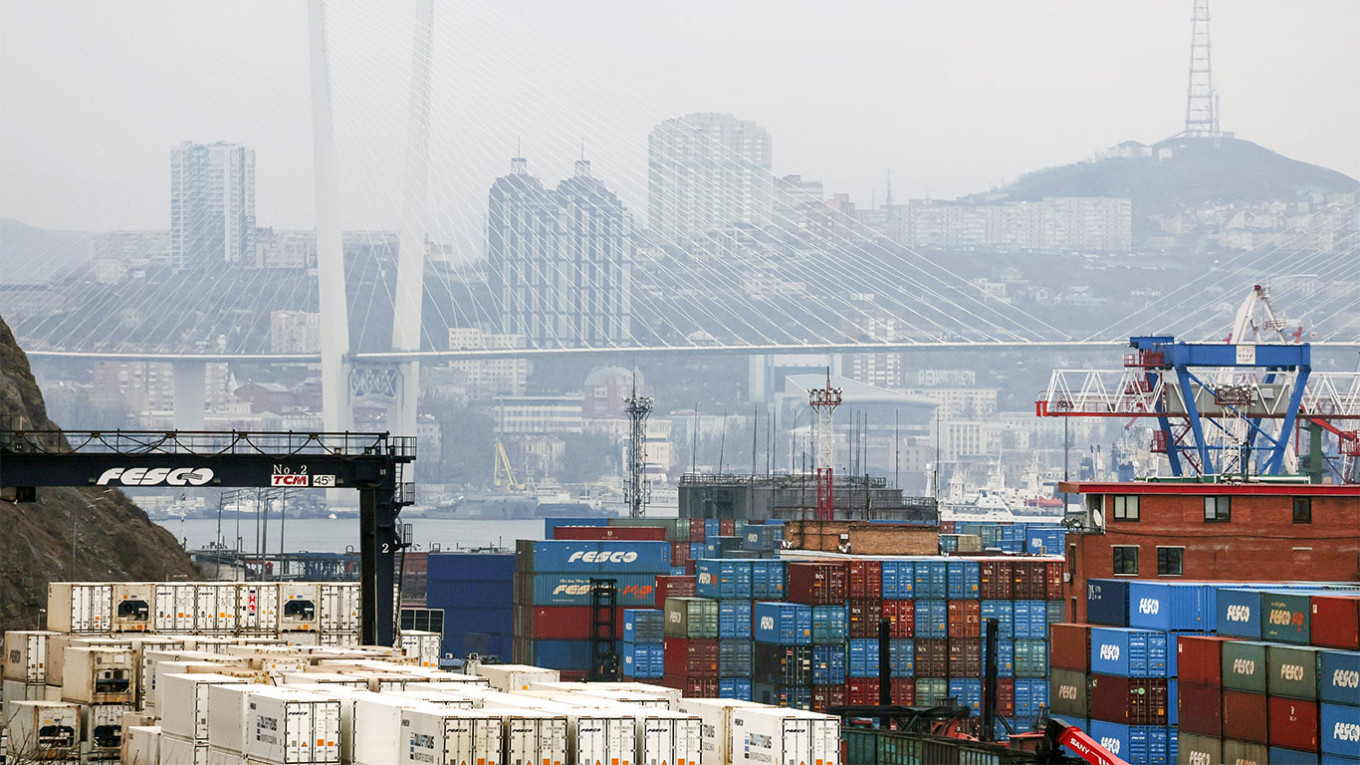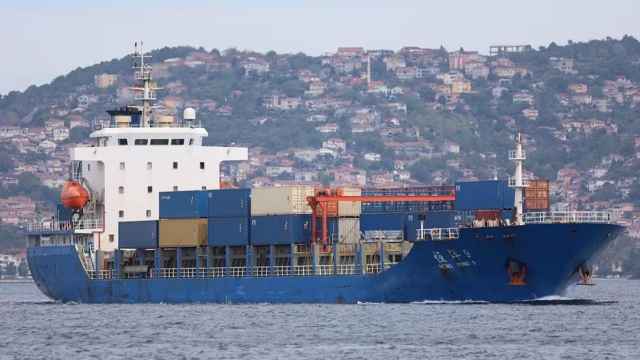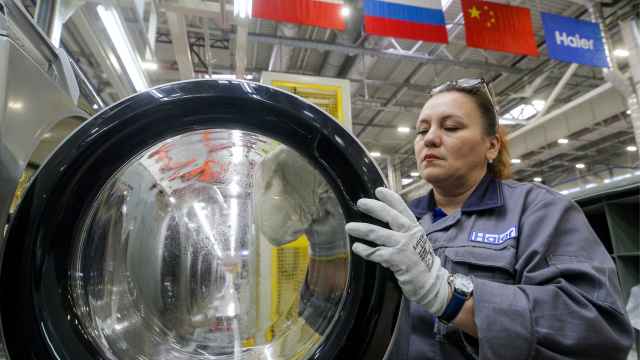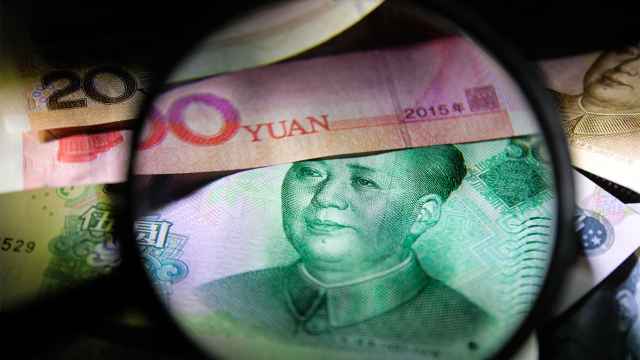Business at RTSB-RUS, a logistics company that ships cargo by rail across Russia, has boomed over the last 18 months. Amid an exodus of Western rivals and a surge in trade with China, its freight volumes jumped nearly fourfold in 2022 alone, Chief Executive Alexander Baskakov told The Moscow Times.
Elevated cargo shipments are just one sign of how quickly Russia’s “pivot to Asia” has taken off. The invasion of Ukraine and deluge of Western sanctions cut Russia off from its previously vital European trade markets, triggering a scramble in Moscow to replace lost income and supply chains with Asian alternatives.
Russia’s trade with China jumped 30% last year to a record $191 billion, according to Chinese customs data. In the first six months of 2023, trade turnover in dollar terms was more than double pre-pandemic levels.
But such a rapid increase in the volume of goods flowing between the two countries is putting pressure on Russia’s logistics and infrastructure network, which is buckling under the weight of higher demand. Now crowded border crossings, at-capacity railways and overloaded ports are threatening to limit how far and how quickly Russia can continue to turn eastward.
“There is enough existing capacity to work at the limit during peak times. But if we talk about a further increase in cargo volumes, then it is absolutely necessary to build up infrastructure,” said Baskakov.
Although Russia’s “pivot to Asia” has been on the government’s agenda for more than a decade, the country has made little progress in building up infrastructure to handle the practical implications of boosting trade. Analysts say the problem stems from Russia’s political system.
“The situation we see today is a combination of a variety of factors, which however almost all speak to the difficulties of prioritizing long-term policy goals over short-term political gains in a personalist autocracy like Russia,” said András Tóth-Czifra, a fellow at the Foreign Policy Research Institute.
Over the past decade, large-scale projects that have received President Vladimir Putin’s personal blessing — like the Nord Stream 2 pipeline or the Crimea bridge — have been delivered, while regional investment projects such as upgrading railway border crossings or modernizing the cargo port at Vladivostok have taken a backseat.
Logistics companies say these less headline-grabbing projects are where the bottlenecks are appearing today.
“Equipment is sorely lacking. There is a shortage of shipping containers … not enough space at storage sites in Russia … a lack of equipment at receiving depots in Russia … and many storage warehouses at the borders are unprepared for the influx of cargo,” said Alexei Zahudalin, head of logistics at SLK, a Russia-based logistics firm.
Part of the problem has also been a change in the type of trade between Russia and China.
Russia previously brought much of its machinery, pharmaceuticals and auto parts from Europe. Now that it is looking to China for those products — along with consumer goods, smartphones, cars and agricultural equipment — Russia is facing a major shortage of closed cargo containers that are used to transport such goods by sea and rail, shippers and logistics firms told The Moscow Times.
According to a survey of logistics firms by the Institute of Natural Monopolies Research, a research body, the top reason cited by respondents as constraining further growth in Russia’s trade with Asia was a lack of capacity on Russia’s rail networks.
“Railway capacity is a bottleneck for exports at the moment, which, unfortunately, is not meeting the needs of all exporters,” said Baskakov.
Earlier this year, state-owned Russian Railways said every month some 1,600 container trains wanted to cross the border between Russia and China at Zabaikalsk, one of the most important trading hubs between the two countries — five times the crossing’s maximum capacity.
The country’s ports and roads, too, are overloaded.
The number of containers being shipped by sea through Russia’s Far East tripled between January and November last year, according to a report by SeaLogic, an information provider for the Russian shipping industry. But growth has stalled since then as processing facilities have hit capacity.
SLK’s Zahudalin says he has seen signs of serious investment from Russia over the last 18 months to address some of the key bottlenecks, and other shipping companies report that the worst logjams at ports and railway border crossings that accompanied the initial surge in trade last year have eased.
But capacity constraints remain, as do questions about Russia’s ability to finance upgrades.
The government posted a 2.6 trillion ruble deficit ($29 billion) in the first half of the year as energy revenues plummeted and spending to fund the war in Ukraine spiraled. The National Wealth Fund — touted for years as a war chest for major infrastructure investments — is now being used to cover a shortfall in day-to-day spending and to prop up the value of the ruble.
“One hope is that Asian, mostly Chinese, investors will come to the rescue — and government officials on various levels have openly courted them since the beginning of this year,” said Tóth-Czifra.
But Chinese investors have so far appeared lukewarm about pouring cash into Russia, given some of the drastic steps — capital controls, asset stripping and de facto nationalization — Moscow has taken against Western companies over the last year.
Wherever the funds come from, logistics firms say Russia cannot pull off its pivot to Asia without investing in infrastructure.
“If we are hoping for a bright future, infrastructure needs to be developed,” said director Baskakov.
A Message from The Moscow Times:
Dear readers,
We are facing unprecedented challenges. Russia's Prosecutor General's Office has designated The Moscow Times as an "undesirable" organization, criminalizing our work and putting our staff at risk of prosecution. This follows our earlier unjust labeling as a "foreign agent."
These actions are direct attempts to silence independent journalism in Russia. The authorities claim our work "discredits the decisions of the Russian leadership." We see things differently: we strive to provide accurate, unbiased reporting on Russia.
We, the journalists of The Moscow Times, refuse to be silenced. But to continue our work, we need your help.
Your support, no matter how small, makes a world of difference. If you can, please support us monthly starting from just $2. It's quick to set up, and every contribution makes a significant impact.
By supporting The Moscow Times, you're defending open, independent journalism in the face of repression. Thank you for standing with us.
Remind me later.








